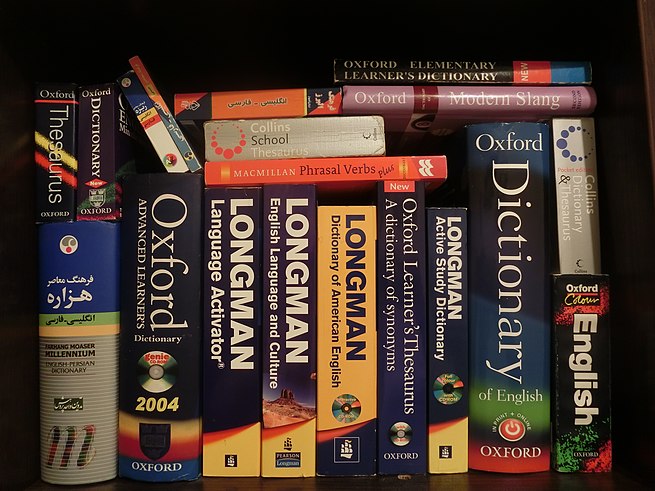
Main Difference
The main difference between Dictionary and Thesaurus is that the Dictionary is a collection of words and their meanings and Thesaurus is a reference work that lists words grouped together according to similarity of meaning.
-
Dictionary
A dictionary, sometimes known as a wordbook, is a collection of words in one or more specific languages, often arranged alphabetically (or by radical and stroke for ideographic languages), which may include information on definitions, usage, etymologies, pronunciations, translation, etc. or a book of words in one language with their equivalents in another, sometimes known as a lexicon. It is a lexicographical reference that shows inter-relationships among the data.A broad distinction is made between general and specialized dictionaries. Specialized dictionaries include words in specialist fields, rather than a complete range of words in the language. Lexical items that describe concepts in specific fields are usually called terms instead of words, although there is no consensus whether lexicology and terminology are two different fields of study. In theory, general dictionaries are supposed to be semasiological, mapping word to definition, while specialized dictionaries are supposed to be onomasiological, first identifying concepts and then establishing the terms used to designate them. In practice, the two approaches are used for both types. There are other types of dictionaries that do not fit neatly into the above distinction, for instance bilingual (translation) dictionaries, dictionaries of synonyms (thesauri), and rhyming dictionaries. The word dictionary (unqualified) is usually understood to refer to a general purpose monolingual dictionary.There is also a contrast between prescriptive or descriptive dictionaries; the former reflect what is seen as correct use of the language while the latter reflect recorded actual use. Stylistic indications (e.g. “informal” or “vulgar”) in many modern dictionaries are also considered by some to be less than objectively descriptive.Although the first recorded dictionaries date back to Sumerian times (these were bilingual dictionaries), the systematic study of dictionaries as objects of scientific interest themselves is a 20th-century enterprise, called lexicography, and largely initiated by Ladislav Zgusta. The birth of the new discipline was not without controversy, the practical dictionary-makers being sometimes accused by others of “astonishing” lack of method and critical-self reflection.
-
Thesaurus
In general usage, a thesaurus is a reference work that lists words grouped together according to similarity of meaning (containing synonyms and sometimes antonyms), in contrast to a dictionary, which provides definitions for words, and generally lists them in alphabetical order. The main purpose of such reference works for users “to find the word, or words, by which [an] idea may be most fitly and aptly expressed” – to quote Peter Mark Roget, architect of the best known thesaurus in the English language.Although including synonyms, a thesaurus should not be taken as a complete list of all the synonyms for a particular word. The entries are also designed for drawing distinctions between similar words and assisting in choosing exactly the right word. Unlike a dictionary, a thesaurus entry does not give the definition of words.
In library science and information science, thesauri have been widely used to specify domain models. Recently, thesauri have been implemented with Simple Knowledge Organization System (SKOS).
-
Dictionary (noun)
A reference work with a list of words from one or more languages, normally ordered alphabetically, explaining each word’s meaning, and sometimes containing information on its etymology, pronunciation, usage, translations, and other data.
“wordbook”
-
Dictionary (noun)
Any work that has a list of material organized alphabetically; e.g., biographical dictionary, encyclopedic dictionary.
-
Dictionary (noun)
An associative array, a data structure where each value is referenced by a particular key, analogous to words and definitions in a physical dictionary.
-
Dictionary (verb)
To look up in a dictionary.
-
Dictionary (verb)
To add to a dictionary.
-
Dictionary (verb)
To compile a dictionary.
-
Dictionary (verb)
To appear in a dictionary.
-
Thesaurus (noun)
A publication, usually in the form of a book, that provides synonyms (and sometimes antonyms) for the words of a given language.
“”Roget” is the leading brand name for a print English thesaurus that lists words under general concepts rather than just close synonyms.”
-
Thesaurus (noun)
A dictionary or encyclopedia.
-
Thesaurus (noun)
A hierarchy of subject headings — canonic titles of themes and topics, the titles serving as search keys.
-
Dictionary (noun)
a book or electronic resource that lists the words of a language (typically in alphabetical order) and gives their meaning, or gives the equivalent words in a different language, often also providing information about pronunciation, origin, and usage
“I’ll look up ‘love’ in the dictionary”
“the dictionary definition of ‘smile’”
“the website gives access to an online dictionary”
-
Dictionary (noun)
a reference book on a particular subject, the items of which are typically arranged in alphabetical order
“a dictionary of quotations”
-
Dictionary (noun)
a set of words or other text strings made for use in applications such as spellcheckers
“the worm attempts to crack account passwords using a built-in dictionary”
-
Thesaurus (noun)
a book that lists words in groups of synonyms and related concepts.
-
Thesaurus (noun)
a dictionary or encyclopedia.
